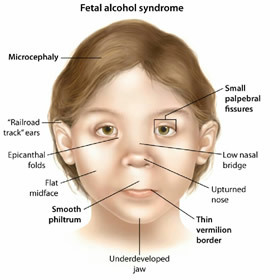STOP DRINKING DURING PREGNANCY! ALCOHOL AND OTHER ABUSES
4 min read
ALCOHOL
Once ingested and absorbed, alcohol is released into our whole organism. It is a toxic substance which can damage many apparatuses: among them, we mention the cardiovascular system, the nervous system, the endocrine system, the respiratory system, but also the gastrointestinal tract and the immune system. Due to the fact that alcohol is mainly metabolized by the liver, it interferes strongly with the reactions of sugars, proteins, lipids and vitamin.
Especially in the Western world, we can observe an over consumption of alcohol, and it is considered as one of the oldest and most common addictions.

If it is consumed during pregnancy, alcohol causes what is called Fetal-Alcohol-Syndrome.
Be careful, because until now no threshold dose has yet been defined: so, this means that any kind of alcohol consumption during pregnancy, also if it is minimal, could expose the unborn baby to these problems. However, the more alcohol abuse, the more are the risks you have to face.
FETAL-ALCOHOL-SYNDROME (FAS)
This condition is a sign of the exposure of the mother to alcohol during pregnancy, and it has well-defined and common features.
If does not occur the miscarriage, often there is a premature birth: the fetus suffers from a stunted growth and at the time of birth the baby is underweight, with deformities and microcephaly.
The most evident physical alterations are a small skull, close eyes with skin folds and short palpebral fissures. The forehead is flat, the philtrum (that is the wrinkle under the nose, also known as the Cupid’s bow) and the nose are short. The top lip is particularly thin and the outer ears are barely shaped.

Even though the physical alterations are a distinctive trait of the syndrome, they are not the only consequences of alcohol abuse for a pregnant woman. Indeed, often the baby will also have some neurobehavioral deficits, such as attention deficit disorder and learning disability, hearing disorders, heart anomalies and skeletal anomalies. In some cases, the alterations of the nervous system cause epilepsy.
A study published in the magazine “Alcoholism: Clinical and Experimental Research” showed that the damages are higher if the mother drinks during the second half of the first trimester of pregnancy because in this way FAS deficits increase.
CANNABIS
Since cannabis is able to overcome the placenta, it seems that it causes some lacks within the maturation of the central nervous system from both a morphological and functional point of view, and so it causes psychological and neurological disorders.
Often, the fetus is underweight, with short arms and legs, and a reduced head size. It has tremors at birth and visual stimuli are annoying, barely tolerated. May be delays both within the language development (with difficulty in speech articulation) and a decrease of attention and memory disorders. Even the sleep cycle often is messed up.
COCAINE AND BABY CRACK
Babies whose mothers during the perinatal period use cocaine are called baby crack.
Even cocaine is a substance with teratogenic effects (and that means that it damages the fetus during the pregnancy), which by overcoming the placenta gathers in the fetal tissues. It may cause serious problems to the pregnant mother such as the placental abruption, that is the main cause of death of the fetus. Besides, the fetus does not have a sufficient supply of oxygen (fetal hypoxia), it grows too little, with microcephaly and myelin disorders.
Myelin is a “fatty” and protein-based substance, which covers the neurons and so, it accelerates the transmission of nerve impulse: a myelin alternation shows problems within nerve conduction.
At birth, the baby is very irritating, with a high risk of cerebral and intraventricular hemorrhages, and convulsions. This causes a high risk of sudden death.
Even in this case, an attention-deficit occurs, a language disorder and a hyperactivity disorder with an IQ lower than normal.
Often babies suffer from a neonatal abstinence syndrome: an actual withdrawal symptom, which often needs barbiturates to be sedated.
NICOTINE
Nicotine and other substances contained in a cigarette interfere with the functionality of the corpus luteum, which is vital to the production of progesterone and to the maintenance of the early stages of pregnancy. Since smoke alters the proper functioning of the corpus luteum, it causes both infertility and miscarriages.
Since nicotine overcomes the blood-brain barrier, often cognitive disorders and more arise. Testosterone levels are low with a resultant demasculinization and a higher susceptibility to infections.
Besides, due to vasoconstriction the baby receives less oxygenated blood with a resultant tissue distress. The carcinogenic substances produced from the combustion of the cigarette can also cause the development of tumors and leukemias from the first months of life. Often the respiratory distress the baby is under can lead to death.
Unfortunately, there are many substances/drugs/medicine whose usage during pregnancy is very dangerous, so it would be impossible to discuss all of them in a single article. But, if you have any questions, please let me know!
If you are curious about learning more about other substances we often abuse (and that should be avoided, or at least checked carefully during pregnancy), here is an article.

Mi chiamo Giulia. Diplomata al liceo classico, ho in seguito conseguito la laurea triennale in Interpretariato e Comunicazione e poi la laurea magistrale in Traduzione Specialistica. Ho lavorato sia come traduttrice per una piattaforma digitale sia come interprete di conferenza in sede di udienza. Ho da sempre avuto una forte propensione per le lingue straniere motivo per cui ho deciso di intraprendere questo percorso. Sono anche appassionata di cucina, cinema ma soprattutto di film e serie tv







